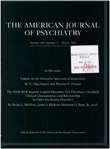CSF oxytocin in anorexia nervosa and bulimia nervosa: clinical and pathophysiologic considerations
Abstract
Oxytocin is a hypothalamic neuropeptide with both centrally and peripherally directed pathways. Data from experimental animals indicate that oxytocin impairs consolidation of aversively conditioned behaviors and is released after feeding or experimental gastric distension. The authors report that the mean CSF oxytocin level of five underweight women with restricting anorexia, but not 12 underweight bulimic anorexic women or 35 normal-weight women with bulimia nervosa, was significantly lower than the level of 11 control subjects. Restricting anorexic patients' low CSF oxytocin levels may reflect their persistently low food intake, and this behavior may exacerbate their tendency for perseverative preoccupation with adverse consequences of food intake.
Access content
To read the fulltext, please use one of the options below to sign in or purchase access.- Personal login
- Institutional Login
- Sign in via OpenAthens
- Register for access
-
Please login/register if you wish to pair your device and check access availability.
Not a subscriber?
PsychiatryOnline subscription options offer access to the DSM-5 library, books, journals, CME, and patient resources. This all-in-one virtual library provides psychiatrists and mental health professionals with key resources for diagnosis, treatment, research, and professional development.
Need more help? PsychiatryOnline Customer Service may be reached by emailing [email protected] or by calling 800-368-5777 (in the U.S.) or 703-907-7322 (outside the U.S.).



